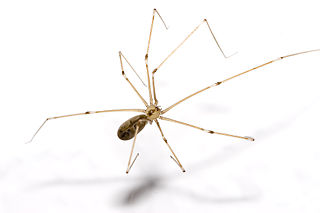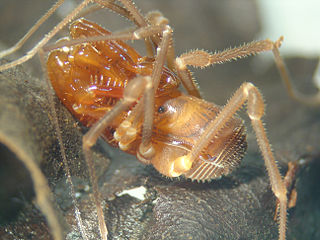Related Research Articles

The Opiliones are an order of arachnids colloquially known as harvestmen, harvesters, harvest spiders, or daddy longlegs. As of April 2017, over 6,650 species of harvestmen have been discovered worldwide, although the total number of extant species may exceed 10,000. The order Opiliones includes five suborders: Cyphophthalmi, Eupnoi, Dyspnoi, Laniatores, and Tetrophthalmi, which were named in 2014.

The Pholcidae are a family of araneomorph spiders. The family contains more than 1,800 individual species of pholcids, including those commonly known as cellar spider, daddy long-legs spider, carpenter spider, daddy long-legger, vibrating spider, gyrating spider, long daddy, and skull spider. The family, first described by Carl Ludwig Koch in 1850, is divided into 94 genera.

Cosmetidae is a family of harvestmen in the suborder Laniatores. With over 700 species, it is one of the largest families in Opiliones. They are endemic of the New World with a Nearctic-Neotropical distribution where a large fraction of the diversity of Opiliones are represented by this single family. Cosmetidae have the northern extent of their range into the USA, where a small number species occur in the southern states. However, the family is especially diverse in Mexico, Central America and northern South America; especially the Andean realms. Their range also extends further south into Argentina and southern Brazil, but they are absent in Chile. Cosmetidae are prevalent in Amazonian region, but only relatively few also occur in Brazilian Atlantic Forest. Several species are also found in the Caribbean.

The Eupnoi are a suborder of harvestmen, with more than 200 genera, and about 1,700 described species.

The Sclerosomatidae are a family of harvestmen with about 1,300 known species. One former subfamily has been recently removed to form a new family, Globipedidae.

Epedanidae is a family of the harvestman infraorder Grassatores with about 200 described species. They are the sister group of the Gonyleptoidea.
Agoristenidae are a neotropical harvestman family of the Suborder Laniatores, in the superfamily Gonyleptoidea.

The Cranaidae are a family of neotropical harvestmen within the suborder Laniatores.
The Icaleptidae are a small family of neotropical harvestmen within the suborder Laniatores. Although only two species have been described, many more are probably to be discovered.
The Zalmoxidae are a family of harvestmen within the suborder Laniatores.
Escadabiidae is a small neotropical family of the harvestman infraorder Grassatores with six described species.
Kimulidae is a small neotropical family of the harvestman infraorder Grassatores with about thirty described species.

Stygnommatidae is a small neotropical family of the harvestman infraorder Grassatores with about thirty described species.

Samoidae is a family of the harvestman infraorder Grassatores with about fifty described species.
Biantidae is a family of the harvestman infraorder Grassatores with about 130 described species.
The Synthetonychiidae are a small family of harvestman with a handful of species in a single genus. They are endemic to New Zealand.

The Travuniidae are a small family of harvestman with little more than ten described species, within the suborder Laniatores.

Stygnomma is a genus of armoured harvestmen in the family Stygnommatidae. There are more than 30 described species in Stygnomma.
References
- Joel Hallan's Biology Catalog: Guasiniidae
- Pinto-da-Rocha, R. & Kury, A.B. (2003): Third species of Guasiniidae (Opiliones, Laniatores) with comments on familial relationships. Journal of Arachnology31(3): 394-399. PDF Archived 2016-03-28 at the Wayback Machine